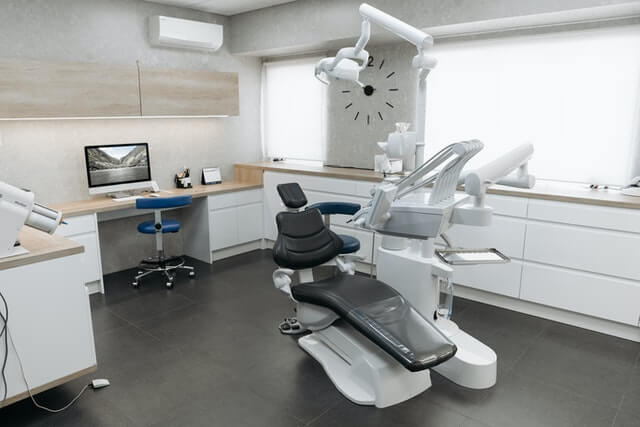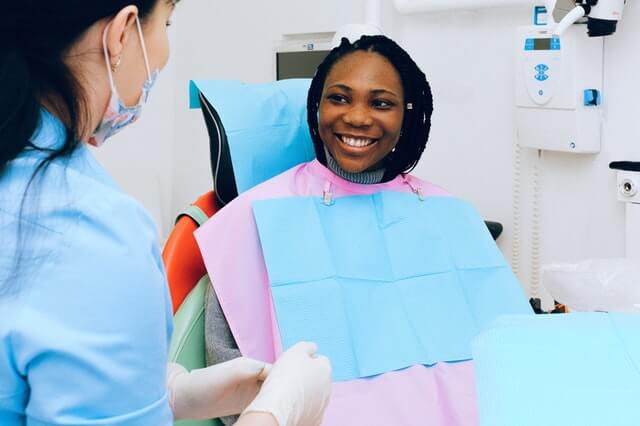Dentist for Anxiety Patients
You wake up one morning and you feel pain in your gums. You know that you have to see the dentist this time. Feeling dreadful, you dial your dentist’s number to book a long-overdue appointment. You arrive at the dentist’s office, palms sweating, and feeling lightheaded. If this is a familiar scenario to you, then you may be experiencing dental anxiety.
It is not uncommon for patients to feel anxious when visiting the dentist. But, if your dental anxiety is causing you too much stress, you may decide to skip or delay your dental visits. And, this may affect your oral health and quality of life. It’s a good thing there are several ways that a dentist for anxiety patients can do to treat dental anxiety.

What is Dental Anxiety?
Dental anxiety is when a person feels very nervous or afraid of visiting the dentist. Even the thought of visiting the dentist can already trigger stress in the person. Dental anxiety affects both adults and children. Objects such as needles, drills, and other tools associated with the dentist may also make the person anxious. Having dental anxiety can be a problem because it may get in the way of you taking care of your oral health. People may delay or even avoid getting dental treatment because of their stress.
What is Dental Phobia?
Dental phobia is a term that also comes up when people talk about dental anxiety. Dental anxiety and dental phobia can make people avoid going to the dentist even when they need urgent oral care. But, they are different from each other. People with dental anxiety experience their symptoms only when faced with the prospect of going to the dentist or related dental situations. Their symptoms don’t last and they are able to live normal lives after an appointment.
Dental phobia is more serious. The person’s extreme fear of dentists hinders them from enjoying their normal lives. This type of phobia is also called dentophobia or odontophobia. People with dentophobia are aware that their fear of dentists or dental situations is irrational. But, they still cannot get over their fear. Their symptoms persist even when they are not in a current situation that would cause them to fear.
What are the symptoms of dental anxiety?
Most dental anxiety symptoms manifest in the same way as general anxiety symptoms. They intensify with the thought of visiting the dentist or anything related to it.
If you have dental anxiety, you may feel your heart palpitate and your palms and feet become very sweaty. People who experience severe dental anxiety may also have panic attacks, cry, or become faint. They worry too much and lose sleep because of it.
It’s no joke to experience anxiety symptoms, and you’re not alone! Research shows that in the United States alone, around 50% to 80% of adults experience some degree of dental anxiety, making others skip their dental visits altogether.
Dentist for Anxiety Patients Near Me
If you are looking for a “dentist for anxiety patients near me”, Sage Dental and Spa in Wall Township, NJ can prescribe medication to help you or your loved one cope with dental anxiety.
Call our office to know more details or to book a consultation.
What are the causes of dental anxiety?
There are many reasons or triggers that contribute to people developing dental anxiety. Here are some of them:
- The fear of pain. – This is one of the most common reasons for both adults and children. Some people associate going to the dentist with feeling pain and this makes them feel nervous.
- Previous negative dental experience. – This is also a very common reason for dental anxiety. You may have had a painful dental experience when you were a child and so you dread going to the dentist as an adult.
- The fear of needles. – A quarter of U.S. adults have a fear of needles, so it’s common to feel anxious about the dentist using them. Dentists use needles in some dental procedures such as administering general anesthesia. But, thanks to modern technology, dental procedures have become less painful or even pain-free.
- Fear of the side effects or the lack of effects of anesthesia. – some people fear the effects of anesthesia on them. Some side effects include nausea and dizziness. Others fear that the anesthesia will not work on them during the dental procedure.
- The feeling of one’s personal space being invaded during dental treatments. – a person may feel extremely uneasy when the dentist has to lean forward to do the procedure.
- The feeling of helplessness or lack of control over what’s happening. – Some people feel uncomfortable opening their mouth for a period of time, being close to the dentist, and not able to see what’s happening.
- Personality traits – according to a study, dental fear and dental anxiety can also be caused by one’s personality traits. A person who is high on neuroticism tends to feel anxious after having a bad experience or hearing “horror stories” about going to the dentist.
- Having a history of General Anxiety Disorder, depression, and posttraumatic stress disorder. – a person diagnosed with a general anxiety disorder (GAD), PTSD, or depression is more prone to developing dental anxiety. Similarly, having a first-degree family member with an anxiety disorder can make you more prone to developing one.
- Feeling embarrassed. – some people who have decayed teeth may feel embarrassed or self-conscious. They don’t want to show the state of their teeth to another person. It helps to know that a good dentist has the training needed to properly handle patients with a wide range of dental problems.
Knowing the cause of your dental anxiety can help you better understand how to cope with it. If you think you have dental anxiety or dental fear, do not hesitate to discuss your concerns with your trusted dentist.
Ways to Relieve Dental Anxiety or Dental Fear

Here are some steps that you can proactively take to help you overcome dental fear and anxiety:
Be open about your concerns to your dentist
This is one of the most important ways to help you manage your anxiety. You can relax more when you know that your dentist understands what you’re going through. The dentist is there to help you and not to harm you, and they can work better if you are open about your concerns to them. For example, if you worry about having a lack of control during your dental procedure, you can ask your dentist to talk you through the procedure. This way, you’ll know about what is being done.
Good dentist-patient cooperation will help in the success of your dental procedure. It will result in a more pleasing experience for both you and your dentist.
Visit the dentist with a friend or a family member
Being in an unfamiliar place such as the dentist’s clinic for the first time can be stressful. So, bringing someone you are familiar with to the dentist’s office can help calm you.
Practice progressive muscle relaxation and meditation
Our muscles become tense when we are under stress. In muscle relaxation, you slowly tense a group of muscles before relaxing them; repeat this process for all muscle groups in your body. The goal is to help you become more aware of the sensations and understand the difference between tense and relaxed muscles. You can manage your anxiety symptoms better if you have a relaxed mind and body.
The use of visualization
Guided imagery is another relaxation method. You do this by visualizing yourself in a relaxing environment. It’s easy to feel overwhelmed with our thoughts and emotions when we are anxious. It helps to bring your attention to something that relaxes you.
Practice deep breathing exercises
Breathing in short, shallow breaths can worsen our anxiety. When we practice deep breathing, we are able to take fuller, longer breaths as we let go of our tension and stress. You can also partner deep breathing exercises with visualization and muscle relaxation.
Distract yourself
Try to distract yourself from thinking about your dental procedure. If your dentist has a television, you can politely ask them if you can watch your favorite show or listen to relaxing music during your visit.
Analgesia
Analgesics are used to treat your dental pain. You can talk to your dentist about which analgesics you can take for your appointment.
Conscious sedation
Sedation is also another way to help relieve mild to severe anxiety in patients. Your dentist may recommend this during long or complex dental procedures. For example, for wisdom tooth extractions and implant surgery. When you’re sedated, you feel very relaxed.
General anesthesia
For patients with severe anxiety, a dentist anesthesiologist may administer general anesthesia. When you are under general anesthesia, you will be completely unconscious and you will feel no pain.
Relieving dental anxiety is a task that you and your dentist can both work on together. So, it helps when you can discuss your worries with your dentist. Using medications or being sedated varies per patient. Your dentist will discuss with you the possible side effects, risks, and precautions involved with these methods.
Frequently Asked Questions
How can dental anxiety affect my oral health?
Dental anxiety will cause you to delay going to the dentist or avoid going to the dentist altogether. Even when you practice good oral hygiene, you will still need regular dental checkups. This is so your dentist can check and detect any signs of problems early. If you are experiencing pain and still opt not to visit the dentist, chances are, you will eventually need to visit in the future. By then, your pain may worsen leading you to have more complicated and more expensive dental procedures.
Scheduling routine dental checkups are one way to help prevent serious oral health problems. Dr. Avi Israeli of Sage Dental and Spa in Wall Township, NJ can help you with your dental needs. Visit or call our dental office for your consultation.
How can sedation help me?
This can be classified as mild, moderate, or deep. Depending on the medication used, your dentist can administer it orally, through IV, or inhalation. Using sedation dentistry can help ease the fear and anxiety of patients, especially during dental surgery. Depending on the level of sedation, you can be completely awake or barely conscious. You may slur your words and forget about what happened during the procedure.
Sedation or general anesthesia for dental anxiety?
While sedated, patients are still awake even if they may have “amnesia” from the procedure afterward. On the other hand, general anesthesia keeps patients completely unconscious throughout. Most dentists can use sedation, while general anesthesia is administered by an anesthesiologist. Your dentist will be able to advise you on the best method for your treatment.
What are the side effects of both procedures?
The side effects of dental anesthesia vary. Some people report feeling nauseous and dizzy, while others feel very tired and confused. Other side effects include hallucinations and slurred speech when speaking. Patients also report having a dry mouth, and numbness.
Sage Dental and Spa in Wall Township
Having a dentist whom you know genuinely cares for you makes the difference. Our trusted dentist, Dr. Avi Israeli is loved by his patients for his professionalism and personable nature.
References:
https://www.healthline.com/health/anxiety/dental-anxiety/

